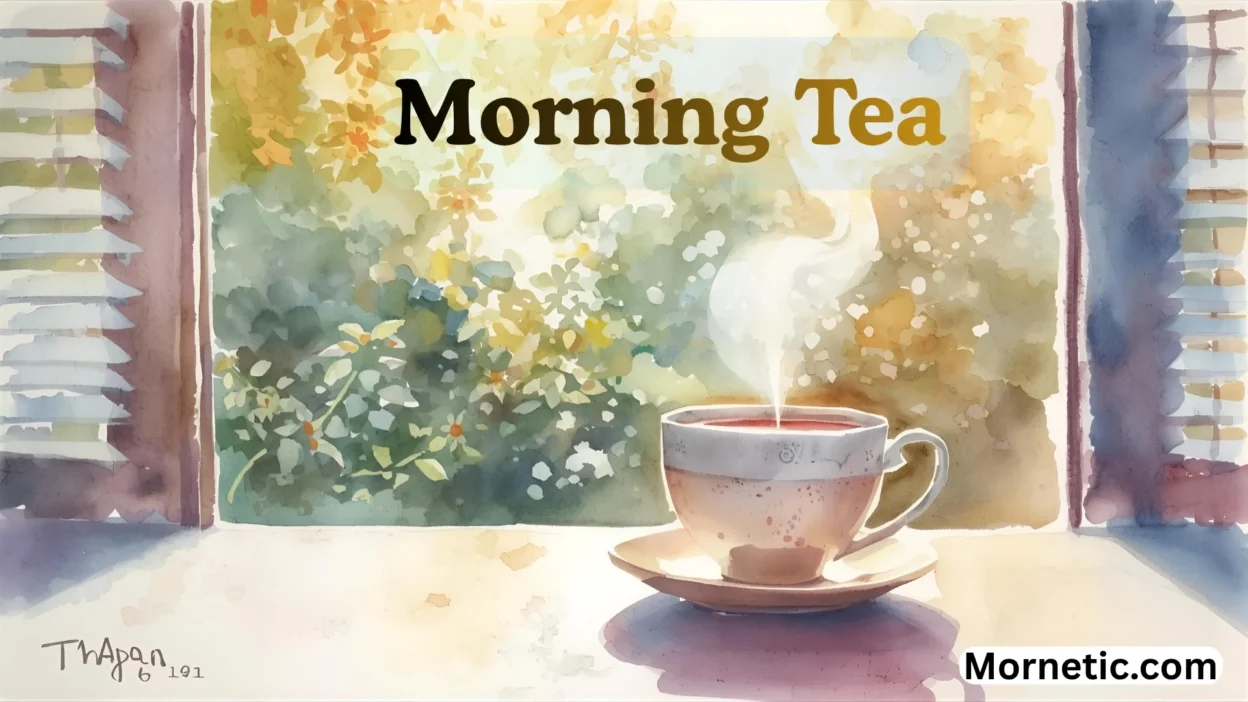In today’s fast-paced world, the simple ritual of morning tea has evolved from a basic caffeine fix to a meaningful wellness practice. As we navigate 2025, the landscape of morning tea consumption has expanded dramatically, with health-conscious consumers embracing tea not just for energy but for its holistic benefits and mindful experience. This comprehensive guide explores why morning tea remains a timeless ritual while adapting to contemporary wellness trends, providing you with both the science and tradition behind the perfect start to your day.
The Remarkable Health Benefits of Morning Tea
Physical Wellness Advantages
- Sustained Energy Without Jitters: Unlike coffee’s abrupt caffeine spike and crash, the L-theanine in tea—particularly green and black varieties—creates a calm alertness that can enhance focus for 4-6 hours
- Powerful Antioxidant Support: Morning tea provides polyphenols and EGCG that combat oxidative stress, with studies showing regular consumers have lower risks of chronic conditions
- Enhanced Digestive Function: Herbal teas like ginger and peppermint—increasingly popular as morning options—activate digestive enzymes to prepare your system for the day’s first meal
- Metabolic Boost: Research indicates the catechins in green tea can increase metabolic rate by 4-5%, making it an ideal morning companion for weight management goals
- Immune System Support: The antibacterial and antiviral properties in tea, especially white and green varieties, provide daily immune reinforcement that’s particularly valuable in post-pandemic awareness
Mental and Emotional Benefits
- Mindful Morning Foundation: The ritual of preparing tea creates a therapeutic pause that sets a intentional tone for the entire day, reducing morning anxiety and rush
- Cognitive Enhancement: The unique combination of caffeine and L-theanine in tea has been shown to improve alpha brain waves, associated with wakeful relaxation and creative thinking
- Stress Resilience Building: Adaptogenic herbs like ashwagandha, now commonly blended with traditional teas, help moderate cortisol levels for better stress management throughout the day
Mastering Morning Tea Brewing Techniques
Optimal Methods by Tea Type
- Black Tea Excellence: Use freshly boiled water (200-212°F) and steep for 3-5 minutes. English Breakfast and Assam varieties are ideal morning choices with their robust, malty profiles that stand up to milk and sweeteners
- Green Tea Perfection: Heat water to 160-180°F (never boiling) and steep for 2-3 minutes only. Over-steeping creates bitterness. For 2025’s popular matcha, whisk 1/2 teaspoon with hot water for a full-leaf nutrient experience
- Herbal Infusion Methods: Most herbal and fruit teas require boiling water and 5-7 minutes steeping to fully release flavors. For trendy ingredients like guava or butterfly pea flower, extend to 8 minutes for vibrant color and taste
- Oolong Morning Preparation: This partially oxidized tea benefits from 195-205°F water with 3-4 minute steeping. The complex flavor profile provides a satisfying middle ground between black and green varieties
Common Brewing Mistakes to Avoid
- ❌ Using Stale Tea Leaves: Tea begins losing freshness after 6 months. The single-origin movement emphasizes fresh, dated teas for optimal flavor
- ❌ Incorrect Water Temperature: This is the #1 mistake. Invest in a variable temperature kettle for perfect extraction every time
- ❌ Rushing the Process: The mindful aspect of tea preparation is part of its benefit. Rushing defeats the purpose of a morning ritual
- ❌ Overlooking Water Quality: Chlorinated tap water can ruin good tea. Use filtered or spring water for superior taste
Global Morning Tea Traditions for Inspiration
Cultural Tea Practices
- British Morning Ritual: The classic English Breakfast blend (often Ceylon-based) remains a staple, typically enjoyed with a splash of milk. The practice emphasizes taking a proper break rather than multitasking
- Japanese Zen Approach: Matcha preparation is a meditative practice in itself, with the whisking ceremony creating mindful focus. The high antioxidant content provides sustained energy without caffeine crash
- Indian Masala Chai Revolution: Traditionally boiled with spices, this method has gone global. The ayurvedic principles behind the spice blends align perfectly with 2025’s wellness focus
- Chinese Gongfu Morning: While elaborate, abbreviated versions allow for mindful engagement with high-quality oolong or pu-erh teas, appreciated for their digestive properties
- Modern American Innovation: The third-wave tea movement treats tea with coffee-like sophistication, emphasizing single-origin, brewing precision, and innovative formats like cold brew and nitrogen-infused teas
Creating Your Hybrid Tradition
In our interconnected world, you can blend elements from various cultures to create a personalized morning tea ritual. Perhaps matcha on busy mornings, a proper loose-leaf on leisurely weekends, and herbal blends when needing digestive support. The key is intentionality rather than rigid adherence to any single tradition.
Morning Tea Trends for 2025: What’s Hot Now
Wellness-Forward Formulations
The biggest trend in 2025 morning tea is functional blending, with consumers seeking specific health benefits from their first cup. These aren’t your basic tea bags—these are sophisticated blends featuring:
- Adaptogen-Infused Blends: Ingredients like ashwagandha, rhodiola, and reishi mushroom are being strategically combined with traditional tea bases to help the body manage stress from the moment you wake up
- Digestive-Focused Morning Teas: With gut health awareness at an all-time high, teas featuring ginger, turmeric, and fennel are becoming standard morning options for those with sensitive digestion
- Cognitive Enhancers: Formulas containing gotu kola, ginkgo, and lion’s mane mushroom are gaining traction among students and professionals seeking mental clarity
Sustainability and Ethical Sourcing
Modern tea drinkers are increasingly concerned with transparency and environmental impact. The 2025 morning tea enthusiast wants to know:
- Single-Origin Transparency: Companies like Renegade Tea Estate are pioneering direct-to-consumer models that cut out middlemen, ensuring farmers receive fair compensation
- Compostable Packaging Revolution: The move away from plastic tea bags to hemp-based, cornstarch, or “naked” tea bags without strings or glue reflects broader environmental concerns
- Regenerative Agriculture: Beyond organic, teas from biodynamic farms that improve rather than just sustain soil health are gaining premium status
Flavor Innovation and Experiential Tea
- Tropical Fruit Infusions: Guava, passionfruit, and mango are dominating the flavor landscape, especially popular with Gen Z and Millennial consumers seeking vibrant color and taste experiences
- Color-Changing Botanicals: Butterfly pea flower, which changes from blue to purple with citrus, represents the Instagrammable trend in morning tea—appealing to visual learners and social media enthusiasts
- Cold Brew Revolution: No longer just for coffee, cold-brewed tea kits are appearing in morning routines, offering smoother, less tannic profiles and lower caffeine content for sensitive individuals
Building Your Perfect Morning Tea Routine
Assessing Your Personal Needs
- Energy Requirements: Be honest about your caffeine needs—those with high demands might prefer strong black tea or matcha, while sensitive individuals might opt for low-caffeine green or white teas
- Time Constraints: If you’re consistently rushed, consider cold brew prepared overnight or high-quality tea bags that deliver flavor without elaborate preparation
- Health Goals: Align your morning tea choice with your wellness objectives—green tea for metabolism, herbal blends for digestion, or adaptogenic teas for stress management
- Taste Preferences: Don’t force yourself to drink teas you dislike. The diversity of options in 2025 means there’s a perfect morning tea for every palate
Creating a Mindful Tea Ritual
- Designated Tea Space: Create a small, dedicated area for your morning tea preparation, even if it’s just a corner of your kitchen counter
- Intention Setting: Before brewing, take three deep breaths and set an intention for your day—this simple practice transforms routine into ritual
- Sensory Engagement: Notice the aroma of dry leaves, the sound of boiling water, the color changes during steeping, and the warmth of the cup in your hands
- Digital-Free Tea Time: Make your tea consumption the one phone-free moment of your morning, allowing true mental space before the day’s demands begin
Morning Tea Pairings for Enhanced Experience
Food Combinations
- Black Tea Partners: Traditional scones, biscuits, or toast complement strong black teas beautifully, with the tannins cutting through the richness of butter or cream
- Green Tea Accompaniments: Light pastries, fruit, or rice crackers enhance rather than overwhelm green tea’s delicate flavor profile
- Herbal Tea Matches: Nuts, seeds, or whole grain toast pair well with herbal teas, creating a balanced nutritional start to your day
- Matcha Combinations: The umami notes in matcha work wonderfully with sweet fruits like bananas or berries and protein sources like eggs or yogurt
Flavor Enhancement Techniques
- Natural Sweeteners: Honey, maple syrup, or stevia can enhance tea without overwhelming its natural flavors—add after brewing to preserve beneficial compounds
- Citrus Accents: A squeeze of lemon or orange not only adds flavor but can increase antioxidant availability in certain teas
- Spice Infusions: Cinnamon, cardamom, or fresh ginger can be steeped with your tea to create custom flavor profiles and additional health benefits
- Milk Alternatives: The rise of oat, almond, and coconut milks has expanded tea possibilities, with each bringing unique creaminess and flavor notes
The Science Behind Tea and Circadian Rhythms
Timing Your Morning Tea
- The Cortisol Connection: Our natural cortisol levels peak between 8-9 AM, meaning caffeine consumed during this window may be less effective. Consider waiting 60-90 minutes after waking for your morning tea
- Metabolic Optimization: Studies suggest that consuming tea 30 minutes before or after meals may optimize nutrient absorption and metabolic benefits
- Hydration Strategy: While tea contributes to hydration, starting your day with plain water before tea ensures optimal rehydration after sleep
- Multiple Cup Approach: Many tea enthusiasts find benefit in different teas at different morning times—perhaps green tea upon waking and herbal tea mid-morning
Tea and Sleep Quality
- Caffeine Half-Life Awareness: The caffeine in tea has a 4-6 hour half-life, meaning morning consumption typically doesn’t interfere with nighttime sleep for most people
- L-Theanine Benefits: Unlike coffee, the L-theanine in tea promotes relaxed alertness that doesn’t contribute to sleep-disrupting anxiety
- Evening Preparation: Preparing your morning tea setup the night before reduces decision fatigue and creates a smooth, peaceful start to your day
Equipment Essentials for the Modern Tea Drinker
Basic Starter Kit
- Variable Temperature Kettle: The single most important upgrade for better tea, allowing precision brewing for different tea types
- Quality Infuser: Whether a basket infuser, French press, or gravity steeper, ensure it provides ample space for leaves to expand
- Digital Scale: For consistent results, measure your tea rather than guessing—2-3 grams per 8 ounces is standard
- Proper Storage: Airtight, opaque containers protect tea from light, air, and moisture—the three enemies of freshness
Advanced Tools for Enthusiasts
- Gaiwan Set: This lidded bowl allows for controlled, short steeps ideal for experiencing the evolution of tea flavors
- Temperature Control Mug: Maintains your tea at ideal drinking temperature without continued steeping
- Water Filter System: Since tea is 99% water, quality makes a dramatic difference in final flavor
- Tea Tray: For those embracing the ceremonial aspect, a proper tray manages water overflow elegantly
Troubleshooting Common Morning Tea Issues
Flavor Problems and Solutions
- Bitterness: Usually caused by water that’s too hot or over-steeping. Reduce temperature or time, particularly for green and white teas
- Weak Flavor: Typically results from insufficient tea quantity or water that’s too cool. Increase leaf-to-water ratio or temperature
- Flat Taste: Often caused by stale tea or mineral-heavy water. Source fresher tea and use filtered water
- Uneven Extraction: May indicate poor water circulation around leaves. Ensure your infuser allows proper movement
Practical Challenges
- Morning Time Crunch: Pre-measure tea the night before or invest in an programmable kettle that heats water at a set time
- Temperature Maintenance: Use a thermos or insulated mug if you need to take your tea on the go
- Multiple Preferences: When brewing for others, consider a modular approach with individual infusers or tea bags
- Cleanup Concerns: Rinse equipment immediately after use to prevent tannin staining and buildup
The Future of Morning Tea: Beyond 2025
Emerging Trends
- Personalized Tea Blends: DNA-based and gut microbiome-informed custom tea formulations are entering the market
- Smart Brewing Devices: IoT-enabled tea makers that adjust parameters based on specific tea types and personal preferences
- Climate-Adaptive Varietals: As climate change affects traditional growing regions, new hybrid tea plants are being developed
- Vertical Integration: More companies controlling the process from farm to cup for quality and sustainability assurance
Lasting Principles
Despite technological advances, the core appeal of morning tea remains constant:
- Connection to Tradition: In our rapidly changing world, tea provides a link to centuries of practice and cultural heritage
- Mindful Pause: The requirement to slow down briefly becomes more valuable as life accelerates
- Natural Simplicity: At its heart, tea remains leaves and water—one of the most straightforward yet profound beverages
- Personal Ritual: The ability to customize and claim this practice as your own ensures its enduring relevance
Frequently Asked Questions About Morning Tea
What is the best tea for morning energy without coffee?
Matcha green tea stands out as the optimal morning energy source because it provides sustained energy without jitters or crash. The combination of caffeine and L-theanine promotes alert calmness that can last 4-6 hours, and because you’re consuming the whole leaf, you receive 100% of the nutrients rather than an infusion. Other excellent options include yerba mate for a coffee-like experience, black tea for traditional caffeine content, and guayusa for smooth energy.
How does morning tea differ from afternoon tea in benefits?
Morning tea typically features higher caffeine content and more energizing properties, while afternoon tea often emphasizes calming and digestive benefits. The chemical composition remains similar, but cultural traditions and practical needs have shaped different consumption patterns. In 2025, we’re seeing more people tailor their morning tea to specific energy and focus needs while using afternoon tea for stress reduction and digestion.
Can morning tea genuinely replace coffee?
For approximately 60-70% of people, tea can successfully replace coffee as a primary morning beverage, particularly if the transition is gradual. Those with higher caffeine dependence might benefit from a hybrid approach—beginning with a black tea matcha blend before moving to pure tea. The key advantage is avoiding coffee’s characteristic energy crash while gaining more sustained productivity and fewer digestive issues for sensitive individuals.
What is the ideal steeping time for maximum morning tea benefits?
Optimal steeping times vary significantly by tea type:
- Black tea: 3-5 minutes at 200-212°F
- Green tea: 2-3 minutes at 160-180°F
- White tea: 4-6 minutes at 175-185°F
- Herbal tea: 5-8 minutes at 212°F
- Oolong tea: 3-4 minutes at 195-205°F
Under-steeping fails to extract full flavor and benefits, while over-steeping can release excessive tannins that cause bitterness and digestive discomfort.
How has the morning tea landscape changed in 2025?
The 2025 morning tea scene reflects several key shifts:
- Wellness Integration: Tea is now viewed as a functional health product rather than just a beverage
- Premiumization: Consumers are trading up from basic tea bags to specialty loose leaf and sachets
- Sustainability Focus: Ethical sourcing and eco-friendly packaging are now decision factors rather than afterthoughts
- Ritual Emphasis: The preparation and consumption process is valued as mindful practice rather than mere caffeine delivery

Grace is a lifestyle writer from California who loves starting mornings with positivity. At Mornetic, she shares uplifting quotes and cheerful messages to brighten your day.




